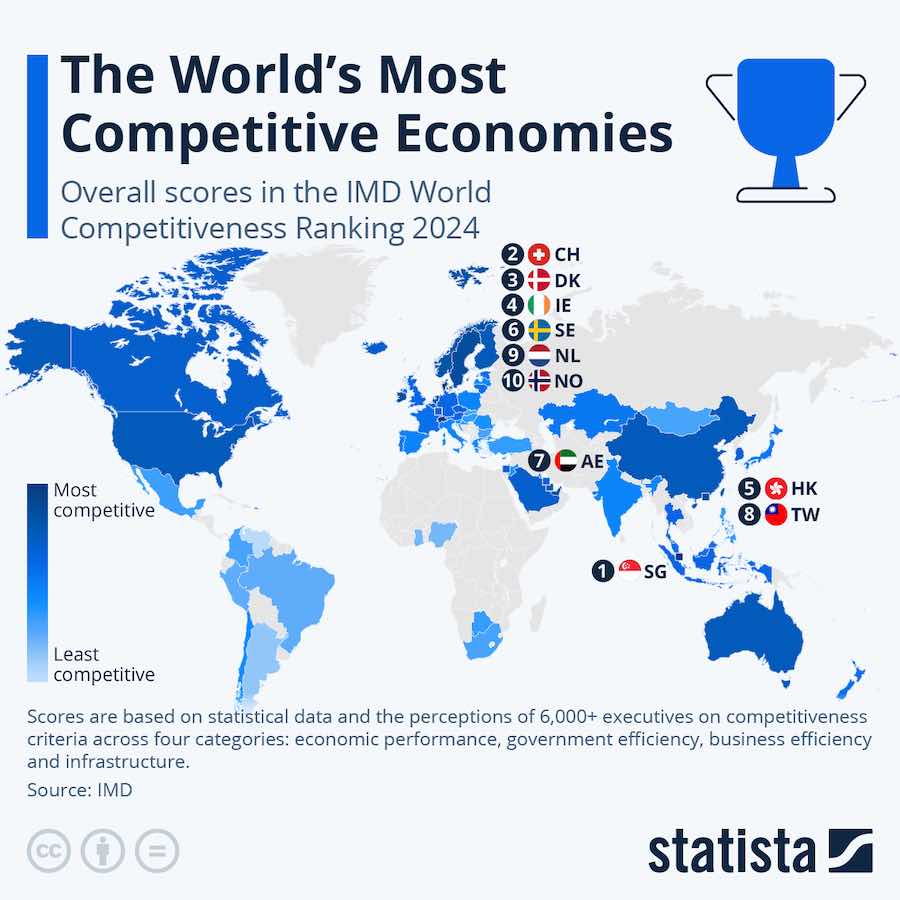This is a major finding of the 2024 IMD World Competitiveness Ranking (WCR), which measures economies with population size and GDP on both ends of the scale.
Switzerland was second and Denmark third, while Nigeria, Ghana, and Puerto Rico made their débuts. The WCR provides these economies with “a timely performance indicator coupling as a unique tool tailored to their specific needs and challenges,” said Arturo Bris, Director of the IMD World Competitiveness Center which produces the yearly ranking.
“It serves as a benchmark for these countries to measure their progress and identify areas for improvement, offering a clear path towards their economic development but also supporting global goals such as the SDGs.”

No sling required for Singapore
Singapore’s performance marks a return to form; last occupying first place in 2020, it then fell to fifth, third, and finally fourth in the following years, while Denmark and Switzerland performed a tussle for power over the top spot.
The data shows a particularly robust performance for the island nation across the areas of government efficiency (the extent to which government policies are conducive to competitiveness) and business efficiency (how well enterprises are performing in an innovative, profitable, and responsible manner).
The other two areas within which the combined 164 pieces of statistical data and 6,612 survey answers are grouped are economic performance (a macro-economic evaluation of the domestic economy) and infrastructure (the degree to which basic, technological, scientific, and human resources meet the needs of business).
“The best-performing economies balance productivity and prosperity, meaning they can generate elevated levels of income and quality of life for their citizens while preserving the environment and social cohesion,” said Bris.
Ireland dropped to fourth, while Hong Kong SAR improved two positions to take fifth place and Sweden advanced the same number of spots to take sixth. The UAE climbed three places to take seventh, while Taiwan (Chinese Taipei) dropped two places into eighth. The Netherlands fell to ninth, and Norway rose to tenth.
On a regional level, Eastern Asia improved, while Western Europe remained “rather stagnant” reaching its lowest average position since 2020.
AI and the productivity promise
AI can seem like a honey pot to economies seeking productivity boosts. “At the micro level, the recent surge in AI-based technologies could boost efficiency and productivity significantly,” said WCC Senior Economist José Caballero.
It does, however, pose further challenges for businesses. “One of the key challenges for companies is how to implement AI systems that improve efficiency without disrupting business activities. Another is ensuring a chosen AI system’s accuracy; inaccurate systems lead to inefficiencies and reduced productivity. Furthermore, there is a cost-related challenge given that initial investments in AI technology can be substantial while the ongoing costs of maintenance and upgrades to the systems can be significant.”
Caballero pointed to WCC research on executives’ views from the WCR economies about major business trends in 2024. Among a series of detailed questions, respondents were asked to select up to three trends they considered to be having the greatest impact on businesses in 2024. AI adoption (55.1%), the risk of a global economic slowdown in economic activities (52%), and geopolitical conflicts (36.1%) gained the most votes.
When analyzed by sub-region, AI is the top concern for executives from Western Europe, Western Asia & Africa, Ex-CIS and Central Asia, Southern Asia and the Pacific, North America, and South America.
Executives from Eastern Asia and Eastern Europe are most concerned about a global recession, while across the board environmental issues and climate change remain low concerns for executives: 27% consider the transition to zero emissions to be an important trend in the short term, and 12.2% the impact of global warming.
With executives under pressure to balance short-term and long-term priorities, environmental risks are being pushed to the back of the queue.
The true disruptive effects of AI on the economy and financial markets may not become apparent until there’s a downturn, which could spiral into a full-blown crisis unless the risks of AI are addressed, the IMF’s Managing Director Gita Gopinath warned just last month.
Gopinath said the technology could convert an otherwise ordinary downturn into a much deeper economic crisis by disrupting labor markets, financial markets, and supply chains. Discussions on AI’s risks had largely focused on privacy, security, and misinformation, neglecting the very real risk of AI amplifying the next recession.
Aside from the conversation about AI’s risks, it must be remembered that an economy’s competitiveness – that is, the way it juggles its competencies – cannot be reduced to GDP and productivity only, the WCR report says. The way different political, social, and cultural dimensions are handled also dictates the long-term growth and value creation of an economy measurable by job generation and boosts to general welfare, for instance.
In the case of Singapore, potential headwinds to maintaining its position include seizing opportunities and managing disruptions from new technologies such as AI, by supporting workers in reskilling and businesses in transformation. But navigating an uncertain external environment amidst heightened geopolitical tensions and enhancing its competitiveness amidst resource constraints are just as significant, Singapore’s Ministry of Trade and Industry told the WCC.
The city-state’s small size and its maritime (as opposed to continental) setting have gone in Singapore’s favor.





























Discussion about this post